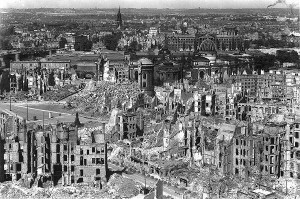Sweden
Despite losing international missionaries, the Swedes were able to maintain nearly twenty full-time, native missionaries during the war. Their convert baptisms increased significantly during the war years even though they had far fewer missionaries. The Swedish Saints had an impressive 85 percent attendance in their Sacrament meetings. Even more astonishingly, their tithing payments increased by 300 percent and their fast offerings increased by 600 percent during the war years. These Saints truly understood the need to help one another and to turn to the Lord in their trials.
Holland

Mormon Potatoes
In an early meeting with Mission President Zappey, Elder Benson advised Zappey to find some land where the Dutch Saints could grow potatoes and alleviate some of their own needs. After finally finding land, the Dutch Saints turned a crop of 66 tons of potatoes the first year. Remarkably, President Zappey made a startling request of the Saints, which they agreed to: “Some of the most bitter enemies you people have encountered as a result of this war are the German people. We know what intense feelings of dislike you have for them. But those people are now much worse off than you are and we are asking you to send your entire potato harvest to the German saints. Will you do it?” This is just one amazing example of the peace that the gospel of Jesus Christ can bring to people.
Finland
Previous to the war, Finland had not been opened to the preaching of the gospel. In his call to this mission, Elder Benson was promised that due to his efforts, many new nations would open to the missionaries. In one of his first meetings in Europe, while in Sweden, Elder Benson felt impressed to call Bro. Fritz Johansson to serve as a Finnish-speaking missionary. After fulfilling his mission to Europe, Elder Benson was still impressed with the need of finding a Finnish-speaking mission president to open a mission there. He was travelling with his wife to the East on Church business. Due to a train leaving early, they were stranded in Kansas City. Elder Benson called the airport and arranged for a flight to take them the rest of the way, and then he phoned the Chicago stake president to have someone pick them up and drive them to the airport. One of the counselors in the stake presidency, Henry A. Matis, met the Bensons, and on the drive inquired about the state of things in Finland. Upon questioning Elder Matis, Elder Benson found Elder Matis’s parents were Finnish, and that he was fluent in the language. Shortly thereafter, Elder Matis was called to serve as the Finnish Mission president. The promise made to Elder Benson was fulfilled dramatically.
Norway
When the brethren met Bro. Olaf Sonsteby, who had been acting as mission president during the war, Sonsteby told them a remarkable story. When occupying powers had taken over, they seized all denominational funds. Bro. Sonsteby moved them repeatedly, but finally resorted to burying the money. When he dug the money up after the war, he inexplicably found an extra 37,000 crowns added to the amount he had buried. The mission was blessed through his efforts.
Germany

Mormon Germany Remains
No country was more devastated than was Germany at the end of the war. The Allied Forces had been merciless in bombing countless cities. When the Church assessed their damages they found that nearly all German meetinghouses had been destroyed. In addition, 80–85 percent of the German Saints had been bombed out of their homes. Many refugees were fleeing Poland to Germany and they brought nothing with them save destitution.
Despite the extremely poor conditions which were so prevalent in Germany, the Saints still had great hope. The brethren received wonderful accounts of German servicemen during the war attending services in other countries, administering the Sacrament, providing blessings, and often giving their rations to the people. This goes to show that even in war there can be kindness and generosity through the teachings of Christ. In one area, the German Saints pulled together and lived the Law of Consecration, helping one another as best they could. Disease was everywhere in the country, and winter was beginning to set in. Most Germans had been on ration for seven years, throughout the war, and their rations were being cut still. Most were on the brink of starving to death. Then the coldest winter recorded during the previous hundred years set in, wiping out even more people who were suffering so badly.
Twitter •


 Watch a video about the restoration of the gospel on lds.org
Watch a video about the restoration of the gospel on lds.org